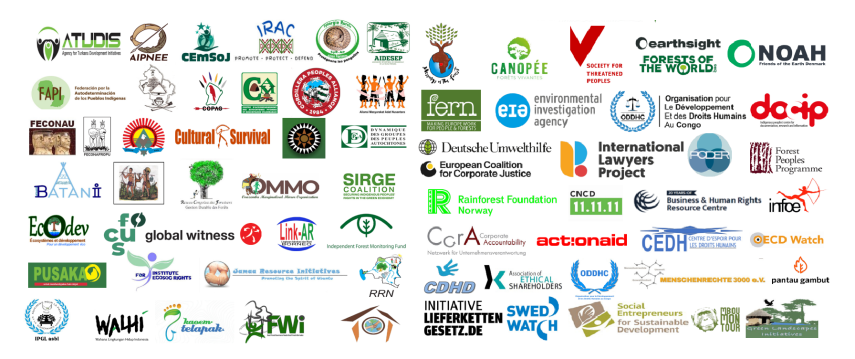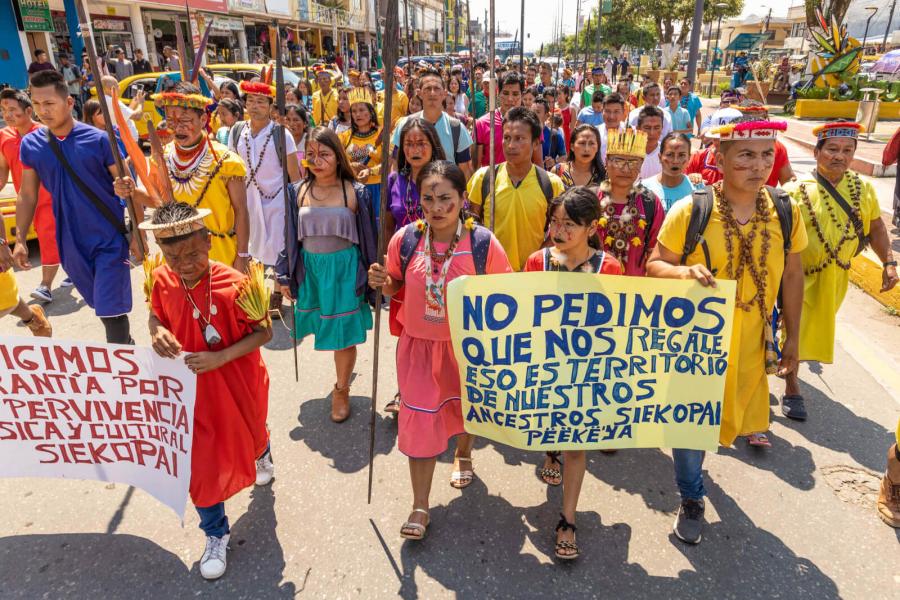
Dear Presidents, Commissioners, and Rapporteur,
We, the undersigned organisations, represent Indigenous Peoples, afro-descendant peoples, and other peoples and communities who share an experience of collective ownership, management and use of our lands, territories and natural resources. Many of us are recognised as human rights, land and environmental defenders for our efforts to protect these lands, territories and resources.
We call on the European Parliament, the Council of the European Union and the European Commission to uphold our internationally recognised rights in the Corporate Sustainability Due Diligence Directive. In this call, we are supported by many human rights and environmental organisations who have endorsed this letter in solidarity.
For countless generations, our peoples – and our brothers and sisters around the world – have diligently taken care of our lands, territories and forests, which are the cornerstone of our knowledge, freedom and survival. The fact that we are better than anyone else at doing this is increasingly recognised by scientists and policymakers in the EU and globally. However, our communities, forests, lands, hunting and gathering grounds, sacred sites, farms and waters continue to be threatened, destroyed and stolen by corporate actors. These actors come from the outside – nearly always without our knowledge and consent – and are very often linked to expanding frontiers of global commodity production driven by international trade and consumption.
Many of the actors encroaching on our lands and forests, as well as those who finance or buy raw materials or products from them, have direct and indirect connections to EU markets, businesses and financial institutions. EU corporate actors grease the wheels of the global supply chains that connect our lands, homes and environment to the daily life and practices of citizens and consumers in the EU. Human rights under threat from EU business, trade and financing activities include the collective right of peoples to self-determination and to lands, territories and natural resources; and rights to cultures, life and security of the person, non-discrimination, water, food and a healthy environment.
We welcome recent EU commitments and initiatives to develop regulatory measures to address harmful human rights and environmental impacts on our communities from business and financial activities linked to the EU. Particularly, we welcome the Commission’s proposal for a directive on Corporate Sustainability Due Diligence which would require companies to undertake mandatory human rights and environmental due diligence in their value chains. We especially welcome the requirements proposed by the Commission for companies to identify and address existing and potential impacts on our communities, lands and territories – in particular through the inclusion of a prohibition to unlawfully take our lands – and to recognize and protect Indigenous Peoples’ right to lands, territories and resources, in accordance with international human rights law and standards.
We have been following the development of this legislation and are thankful for the EP’s adoption of amendments extending the scope of the legislation to rights elaborated in the UN Declaration on the Rights of Indigenous Peoples (UNDRIP), including the right to Free, Prior and Informed Consent (FPIC) and the right to self-determination of Indigenous Peoples. We appreciate that the current amendments include requirements for companies to consult us when undertaking due diligence and respecting Indigenous Peoples’ rights set out in the UN Declaration on the Rights of Indigenous Peoples (UNDRIP) during these consultations.
We, however, regret that the Council’s position includes the removal of any mention of both the UNDRIP and internationally protected land rights of Indigenous Peoples from the proposal in its general approach, effectively excluding an entire group of victims of corporate abuse from being protected under the future EU legislation. This attempt to deny the recognition of Indigenous Peoples’ rights is unacceptable and contradicts EU commitments and the Council’s own 2017 conclusions on Indigenous Peoples which recognise the threats and violence they face and supports the adoption of UNDRIP.
We, therefore, call on the European Parliament, the European Commission and the Council of the EU to ensure the final text of the directive fully protects human rights, both those included by the Commission in its proposal, those rightfully added by the EP, as well as other rights that have been so far overlooked. The final text should also fill existing gaps in the proposal that undermine its objective to address the human rights and environmental impacts that companies are regularly responsible for and that disproportionately affect Indigenous Peoples, afro-descendant peoples, as well as other peoples and communities with customary land tenure, as well as human rights, land and environmental defenders.
In order for the ongoing legislative processes to lead to tangible positive results for human rights and forests we believe that our grounded perspectives bring invaluable insights that the EU cannot afford to overlook, and thus request the EU to ensure that the final text of the CSDDD:
- Requires companies to respect Indigenous Peoples’ rights to their lands, territories, and resources, as well as their right to self-determination and their right to Free, Prior and Informed Consent (FPIC) as protected under international law. The rights of Indigenous Peoples are not only affirmed by the UNDRIP, but are also protected under the International Covenant on Civil and Political Rights (ICCPR), the International Covenant on Economic, Social and Cultural Rights (ICESCR), the International Convention on the Elimination of all forms of Racial Discrimination (ICERD) and the International Convention on the Elimination of all forms of Discrimination Against Women (CEDAW). These treaties have been ratified by all EU member states and should be explicitly referenced in the text to fully capture the body of international law that protects these rights and reflect the obligations of EU Member States to uphold them and to ensure companies respect them throughout their value chains and in their due diligence processes.
- Requires companies to respect the right to their lands, territories, and resources, as well as the right to self-determination and FPIC, of peoples (such as afro-descendant and/or tribal peoples) sharing similar social, cultural and economic characteristics with Indigenous Peoples, in accordance with the ICCPR, ICESCR, ICERD and regional human rights conventions and jurisprudence.
- Requires companies to respect the right to lands and resources of communities with customary tenure systems, as well as their associated rights. These rights are protected under the ICCPR and ICESCR, and ICERD in the context of ethnic groups, and go well beyond the rights currently included in the proposal, including recognition of property rights over lands and resources which they customarily own, use and possess collectively, and yet are regularly violated by activities in companies’ value chains.
- Requires companies to respect the rights of human rights defenders as protected under international law. These rights are protected under the core international human rights treaties and have been elaborated upon in the context of human rights defenders in the UN Declaration on Human Rights Defenders.
- Requires companies to consult and ensure the meaningful and effective participation of rightsholders (including women and youth), as well as human rights, land and environmental defenders throughout their due diligence processes. Only by requiring consultation and effective participation as part of companies’ prevention, mitigation and remediation actions can it be ensured that the outcomes of these processes have the ability to fully meet our needs and expectations, which should include the possibility for the restitution of our land taken through violations of our land ownership rights.
- Ensures the value chain of companies in scope of the law is fully covered, and that due diligence obligations are applied to all potential and actual impacts, regardless of the nature of the business relationship. Impacts affecting our peoples and communities often occur far up the value chain, with suppliers often involved through short-term relationships. This is particularly the case in agricultural and extractive value chains. Whether formal or informal, direct or indirect, any business relationship with an entity responsible for human rights and environmental violations should be captured by the directive. Without such a scope, many of the violations we face would continue unabated.
- Requires due diligence processes to prioritise prevention in the context of land grabbing as human rights and environmental impacts occurring on our stolen lands are often too severe to be mitigated or remediated. In the context where harms have occurred and where remediation is needed, the directive should not allow companies to unilaterally prioritise financial compensation which can often be an unacceptable solution for our peoples and communities. Instead, remedies should be decided in consultation with us, and enable rightsholders to require the restitution and restoration of any dispossessed land.
- Defines clear standards for companies’ grievance mechanisms required under the Directive to ensure complaints can achieve positive outcomes acceptable to us as rightsholders. The directive should require companies to set up grievance mechanisms that are independent, accessible, equitable, transparent, rights-based, gender and culturally responsive and guarantee rightsholders’ protection from threats and retaliation. These grievance mechanisms should also be developed and implemented taking into account the perspective of rightsholders. The same standards should be applied to supervisory authorities that will oversee companies’ compliance with the directive, in order to guarantee their effectiveness.
- Includes specific obligations for companies who are operating in high-risk conflict environments where private security and paramilitary actors – whether directly and formally linked with supply chains or not – are abusing human rights in support of corporate activities. The directive should require companies to assess, through a conflict analysis and consultation with affected peoples and communities, the risk of potential human rights violations from paramilitary or armed groups in conflict affected areas, and refrain from pursuing business activities if it is revealed that the activity would risk contributing to these violations. Due to increased risk of threats and violence from armed groups, FPIC cannot be freely obtained in conflict-affected areas. Therefore, any activity occurring in conflict-affected areas on the lands of Indigenous Peoples or other peoples whose right to FPIC is protected under international law should be deemed in violation of the directive, as respect for the right to FPIC cannot be guaranteed.
- Reverses the burden of proof in civil liability cases both for proving a company’s failure to meet their due diligence obligations and for proving the causal link between this failure and the impact. Our peoples and communities will have little to no access to the detailed due diligence steps taken by companies to comply with their obligations, and while compliance with human right and environmental standards should facilitate access to information in practice, we are very unlikely to have access to detailed information on their suppliers. Both are necessary to establish the liability of a company, and claimants should not be expected to collect and submit evidence principally held by companies.
- Strengthens access to justice for Indigenous Peoples, afro-descendent peoples, and other peoples and communities with customary land tenure, by providing financial, administrative and translation support in submitting substantiated concerns and court cases. Without such support, navigating the diversity of languages and procedural rules in EU Member States will be nearly impossible for us.
- Requires companies to include plans to end deforestation in their business strategy in addition to the obligation for companies to have a plan to ensure that their business strategy is compatible with limiting global warming to 1.5 °C in line with the Paris Agreement. Corporate activities continue to cause dire environmental impacts and hasten climate change, severely impacting our access to traditional foods, and increasing the occurrence and intensity of natural disasters on our territories.
- Requires companies to publicly report on their value chains, including the exact name and location of their suppliers, and actual and potential impacts identified, in order to allow us to identify the actors violating our human rights including our right to a healthy environment, and give us the necessary tools needed to monitor companies’ value chains and contribute to the enforcement of the directive.
- Ensures certifications and other voluntary industry initiatives do not substitute for any of the obligations of companies under the directive. Such schemes often fail to accurately identify impacts and guarantee proper due diligence and they should not be used as evidence of compliance with the requirements of the directive.
- Extends the obligation to carry out human rights and environmental due diligence to the financial sector, by requiring investors and other financial actors to identify impacts prior to providing services, as well as on an ongoing basis. If their due diligence identifies serious human rights and environmental impacts that affect our lands, territories and resources or other fundamental rights, the financial actors must consult with us as rightsholders to determine the appropriate response, which could include, when necessary and required by us, termination of financial agreements with companies that are causing harm even if it will financially impact the company receiving the financial service.
- Ensures that sanctions applied by supervisory authorities in case of non-compliance are dissuasive and based on the company’s annual turnover. Supervisory authorities should also have the power to order remedial action on non-compliant companies.
We call on the European Parliament, the Council of the European Union and the European Commission to uphold the EU’s own human rights commitments and its international obligations, by including these improvements in the final text of the EU Directive on Corporate Sustainability Due Diligence Directive. Securing these provisions in the text would be absolutely necessary to achieve the objectives of the Commission’s proposal to develop a comprehensive human rights due diligence framework and would be consistent with recommendations made by the Parliament in 2018 and 2021. We have taken note of the EU’s failure to include protections for our internationally recognised human rights in its recently adopted regulation on deforestation-free products and call on you to remedy this in the future due diligence legislation. Adopting a human rights and environmental due diligence legislation that does not seek to address human rights violations perpetrated against our peoples and communities would exclude countless people from being able to seek justice for the constant violence inflicted upon us by corporate actors worldwide. We ask you not to miss this opportunity.
Signed by: Endorsed by:




